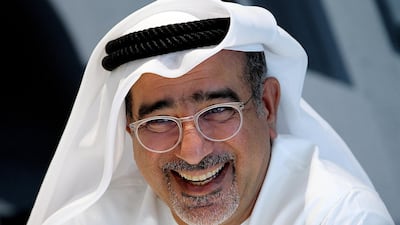HSBC UAE has put in place a three year-plan to grow its business and is open to beefing up assets as it looks to hit over a $1 billion (Dh3.67bn) revenue target in the next three to five years, its chief executive said.
"In our global 2018 Strategy Update, HSBC UAE is identified as one of eight scale markets," Abdulfattah Sharaf, the group general manager and chief executive of HSBC in the UAE told The National in its Dh1bn new headquarters in Dubai. "Our aspiration is to be among the top-five banks [in the UAE] with more than $1bn in revenues over the next 3-5 years."
The lender had total assets of the Dh104.75 billion at the end of 2017, 8 per cent below Dh113.97bn reported at the end of the 2016. Total comprehensive income last year fell 17 per cent to Dh1.3bn from Dh1.57bn a year earlier, according to its financial statement. The bank is pursuing plans to further strengthen its position in the UAE, one of the most over-banked markets in the Arabian Gulf, as it targets asset growth, both organically and inorganically.
“We are always open to look at these things [acquisitions]. We are here to grow and if we find something that suits our requirements then yes. Why not?,” Mr Sharaf said. “We are open to any types of assets."
Banks in the UAE, and the broader economic bloc of the GCC, found it difficult to sustain the same pace of asset growth and profitability due to a softer economic environment amid a three year oil slump. The price of crude, which fell below $30 a barrel in the first quarter of the 2016, has since recovered to over $70 per barrel mark. Lenders are expected to perform better this year than in 2017 as liquidity improves, however profits will likely settle at a lower rate than the oil price boom years, analysts from Moody’s Investors Service and S&P Global Ratings have predicted.
Mr Sharaf said the time is right for HSBC to follow its three-year plan, with growth targeting all business segments: retail, commercial and investment banking.
_______________
Read more:
Mena region is second-worst performing region for HSBC in pre-tax Q2 profit
HSBC to spend $17bn on Asia expansion
Deutsche Bank moves major operation out of London
_______________
“There’s a huge number of clients that we didn’t tap into," he said. "We are going to grow the digital side of the business, which will help us on-boarding [them].”
HSBC, which is globally investing $17bn in digitisation of its operations across different markets, has allocated resources to the UAE for its digitisation as local and international lenders in the country invest heavily in the sector.
Emirates NBD, the biggest bank in Dubai by assets, last year announced plans to spend Dh1bn on digital adoption.
HSBC is driving digital transformation among both its corporate and retail sides of the business. The bank already has a digital customer services unit (CSU) in Dubai and plans to add three more in 2019, Mr Sharaf said, without disclosing how much the bank is spending on digital adoption.
HSBC, which is keen to increase its appeal among the Emirati talent pool, is also prepared to back the UAE government’s initiative of supporting small and medium-sized entities that make up about 60 per cent of the business in the country.
“There’s an appetite to lend to the SMEs but to the right kind of SMEs. The SME client that is looking to connect globally, is the client I want on board and help, because the others [other financial institutions] can’t help them,” he said.
Abu Dhabi is giving a helping hand to SMEs, the key drivers of the UAE economy, under its three-year Dh50bn ‘Tomorrow 2021’ programme. A critical part of the initiative is a working capital credit guarantee programme that will give SMEs access to Dh10bn in financing over the next three years from local banks at reduced interest rates.
The Abu Dhabi government initiative, Mr Sharaf said, has caused much excitement among the bank’s clientele.
“This [stimulus] is amazing. I’ve been meeting clients in Abu Dhabi and they are very excited about it,” he said. “The reflection of that is in Dubai as well. The government in Dubai has consistently invested in projects and infrastructure to help the economy."
The uptick in the UAE economy, the second biggest in the Gulf, bodes well for the companies that are looking to raise funds either from the debt or the capital markets.
Mr Sharaf expects debt issuance - sukuk, bonds and export credit agency-backed deals - to continue even with the expected US Federal Reserve interest rate increases, which usually are mimicked by most GCC sovereigns.
There are several “good companies” planning initial public offerings and some of them are likely to go public next year, he said without saying how many IPO mandates HSBC is working on.
“The market and the situation is improving and liquidity is available [for such deals],” he said.

